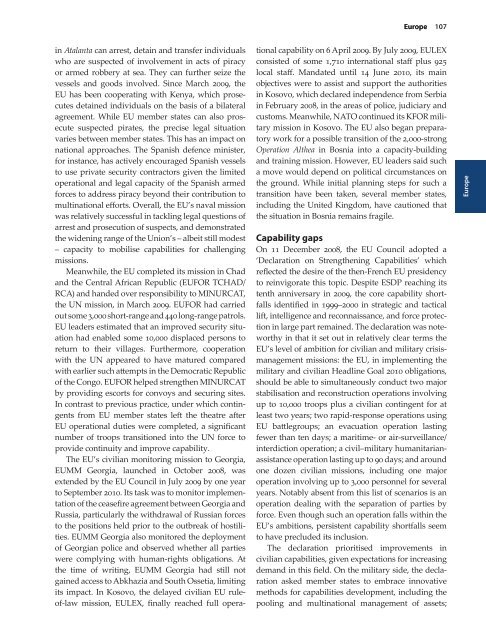You also want an ePaper? Increase the reach of your titles
YUMPU automatically turns print PDFs into web optimized ePapers that Google loves.
in Atalanta can arrest, detain and transfer individuals<br />
who are suspected of involvement in acts of piracy<br />
or armed robbery at sea. They can further seize the<br />
vessels and goods involved. Since March 2009, the<br />
EU has been cooperating with Kenya, which prosecutes<br />
detained individuals on the basis of a bilateral<br />
agreement. While EU member states can also prosecute<br />
suspected pirates, the precise legal situation<br />
varies between member states. This has an impact on<br />
national approaches. The Spanish defence minister,<br />
for instance, has actively encouraged Spanish vessels<br />
to use private security contractors given the limited<br />
operational and legal capacity of the Spanish armed<br />
forces to address piracy beyond their contribution to<br />
multinational efforts. Overall, the EU’s naval mission<br />
was relatively successful in tackling legal questions of<br />
arrest and prosecution of suspects, and demonstrated<br />
the widening range of the Union’s – albeit still modest<br />
– capacity to mobilise capabilities for challenging<br />
missions.<br />
Meanwhile, the EU completed its mission in Chad<br />
and the Central African Republic (EUFOR TCHAD/<br />
RCA) and handed over responsibility to MINURCAT,<br />
the UN mission, in March 2009. EUFOR had carried<br />
out some 3,000 short-range and 440 long-range patrols.<br />
EU leaders estimated that an improved security situation<br />
had enabled some 10,000 displaced persons to<br />
return to their villages. Furthermore, cooperation<br />
with the UN appeared to have matured compared<br />
with earlier such attempts in the Democratic Republic<br />
of the Congo. EUFOR helped strengthen MINURCAT<br />
by providing escorts for convoys and securing sites.<br />
In contrast to previous practice, under which contingents<br />
from EU member states left the theatre after<br />
EU operational duties were completed, a significant<br />
number of troops transitioned into the UN force to<br />
provide continuity and improve capability.<br />
The EU’s civilian monitoring mission to Georgia,<br />
EUMM Georgia, launched in October 2008, was<br />
extended by the EU Council in July 2009 by one year<br />
to September 2010. Its task was to monitor implementation<br />
of the ceasefire agreement between Georgia and<br />
Russia, particularly the withdrawal of Russian forces<br />
to the positions held prior to the outbreak of hostilities.<br />
EUMM Georgia also monitored the deployment<br />
of Georgian police and observed whether all parties<br />
were complying with human-rights obligations. At<br />
the time of writing, EUMM Georgia had still not<br />
gained access to Abkhazia and South Ossetia, limiting<br />
its impact. In Kosovo, the delayed civilian EU ruleof-law<br />
mission, EULEX, finally reached full opera-<br />
Europe<br />
107<br />
tional capability on 6 April 2009. By July 2009, EULEX<br />
consisted of some 1,710 international staff plus 925<br />
local staff. Mandated until 14 June 2010, its main<br />
objectives were to assist and support the authorities<br />
in Kosovo, which declared independence from Serbia<br />
in February 2008, in the areas of police, judiciary and<br />
customs. Meanwhile, NATO continued its KFOR military<br />
mission in Kosovo. The EU also began preparatory<br />
work for a possible transition of the 2,000-strong<br />
Operation Althea in Bosnia into a capacity-building<br />
and training mission. However, EU leaders said such<br />
a move would depend on political circumstances on<br />
the ground. While initial planning steps for such a<br />
transition have been taken, several member states,<br />
including the United Kingdom, have cautioned that<br />
the situation in Bosnia remains fragile.<br />
Capability gaps<br />
On 11 December 2008, the EU Council adopted a<br />
‘Declaration on Strengthening Capabilities’ which<br />
reflected the desire of the then-French EU presidency<br />
to reinvigorate this topic. Despite ESDP reaching its<br />
tenth anniversary in 2009, the core capability shortfalls<br />
identified in 1999–2000 in strategic and tactical<br />
lift, intelligence and reconnaissance, and force protection<br />
in large part remained. The declaration was noteworthy<br />
in that it set out in relatively clear terms the<br />
EU’s level of ambition for civilian and military crisismanagement<br />
missions: the EU, in implementing the<br />
military and civilian Headline Goal 2010 obligations,<br />
should be able to simultaneously conduct two major<br />
stabilisation and reconstruction operations involving<br />
up to 10,000 troops plus a civilian contingent for at<br />
least two years; two rapid-response operations using<br />
EU battlegroups; an evacuation operation lasting<br />
fewer than ten days; a maritime- or air-surveillance/<br />
interdiction operation; a civil–military humanitarianassistance<br />
operation lasting up to 90 days; and around<br />
one dozen civilian missions, including one major<br />
operation involving up to 3,000 personnel for several<br />
years. Notably absent from this list of scenarios is an<br />
operation dealing with the separation of parties by<br />
force. Even though such an operation falls within the<br />
EU’s ambitions, persistent capability shortfalls seem<br />
to have precluded its inclusion.<br />
The declaration prioritised improvements in<br />
civilian capabilities, given expectations for increasing<br />
demand in this field. On the military side, the declaration<br />
asked member states to embrace innovative<br />
methods for capabilities development, including the<br />
pooling and multinational management of assets;<br />
Europe


